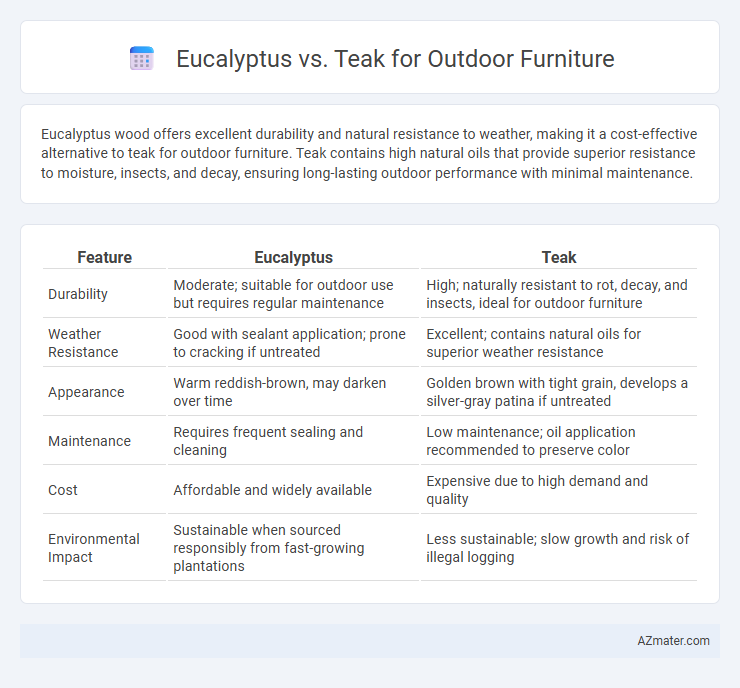Eucalyptus wood offers excellent durability and natural resistance to weather, making it a cost-effective alternative to teak for outdoor furniture. Teak contains high natural oils that provide superior resistance to moisture, insects, and decay, ensuring long-lasting outdoor performance with minimal maintenance.
Table of Comparison
| Feature | Eucalyptus | Teak |
|---|---|---|
| Durability | Moderate; suitable for outdoor use but requires regular maintenance | High; naturally resistant to rot, decay, and insects, ideal for outdoor furniture |
| Weather Resistance | Good with sealant application; prone to cracking if untreated | Excellent; contains natural oils for superior weather resistance |
| Appearance | Warm reddish-brown, may darken over time | Golden brown with tight grain, develops a silver-gray patina if untreated |
| Maintenance | Requires frequent sealing and cleaning | Low maintenance; oil application recommended to preserve color |
| Cost | Affordable and widely available | Expensive due to high demand and quality |
| Environmental Impact | Sustainable when sourced responsibly from fast-growing plantations | Less sustainable; slow growth and risk of illegal logging |
Introduction to Eucalyptus and Teak Wood
Eucalyptus and teak are popular hardwoods used in outdoor furniture due to their durability and natural resistance to weathering. Eucalyptus wood is known for its density, fast growth, and sustainability, making it an eco-friendly choice with moderate resistance to decay and insect damage. Teak wood, prized for its high oil content and tight grain, offers superior longevity, natural water resistance, and exceptional strength, often considered the benchmark for premium outdoor furniture materials.
Durability Comparison: Eucalyptus vs Teak
Teak wood boasts superior durability for outdoor furniture due to its high natural oil content, making it highly resistant to moisture, insects, and decay. Eucalyptus, while also durable and affordable, requires regular maintenance and treatment to withstand weather exposure and prevent deterioration over time. Teak's long-lasting resilience justifies its premium price, whereas eucalyptus offers a cost-effective alternative with moderate durability when properly cared for.
Weather Resistance: How Each Wood Holds Up
Eucalyptus wood exhibits high natural oils and dense grain, providing excellent resistance to moisture, decay, and insect attacks, making it particularly well-suited for outdoor furniture in humid and wet climates. Teak wood, renowned for its natural oils and silica content, offers superior weather resistance, maintaining strength and appearance despite prolonged exposure to sun, rain, and varying temperatures, often outperforming other hardwoods in longevity and durability. While both woods resist weather damage, teak typically requires less maintenance over time, remaining structurally stable and visually appealing with minimal treatment.
Maintenance Requirements for Eucalyptus and Teak
Eucalyptus outdoor furniture requires regular maintenance including annual sanding and sealing to prevent weathering and moisture damage, due to its moderate natural durability. Teak boasts high natural oil content and density, significantly reducing maintenance needs and offering superior resistance to rot and insects with minimal treatment beyond periodic cleaning. Both woods benefit from protective finishes, but teak's inherent properties make it more suitable for low-maintenance outdoor furniture.
Appearance and Color Differences
Eucalyptus outdoor furniture typically features a light beige to medium brown color with a fine, uniform grain that weathers to a silvery gray if untreated. In contrast, Teak boasts a rich golden to medium brown hue with a coarse, oily texture that naturally resists moisture and darkens gracefully over time. The vibrant warmth and oil content of Teak provide superior durability and a luxurious appearance compared to the more affordable and lighter-toned Eucalyptus.
Environmental Impact and Sustainability
Eucalyptus and teak differ significantly in environmental impact and sustainability for outdoor furniture. Eucalyptus grows rapidly and thrives in plantations, offering a renewable source with lower deforestation risk and quicker carbon sequestration. Teak, often harvested from slow-growing natural forests, faces sustainability challenges due to habitat loss and longer regeneration periods despite its durability and natural oils that resist decay.
Cost Analysis: Eucalyptus vs Teak Outdoor Furniture
Eucalyptus outdoor furniture typically costs significantly less than teak, offering a budget-friendly option without compromising on durability or aesthetic appeal. While teak is renowned for its exceptional resistance to weather and insects, its higher price point reflects premium quality and longevity. Consumers seeking cost-effective outdoor furniture often choose eucalyptus for its affordability and reasonable lifespan, balancing initial investment with maintenance needs.
Comfort and Design Versatility
Eucalyptus wood offers moderate comfort with its smooth texture and natural resistance to moisture, making it suitable for outdoor furniture exposed to varying weather conditions. Teak, renowned for its dense grain and high oil content, provides superior comfort due to its natural warmth and durability, reducing the need for cushions. Design versatility of eucalyptus allows for varied finishes and styles, while teak's rich golden hue and fine grain pattern make it ideal for elegant, timeless outdoor pieces.
Pros and Cons of Eucalyptus for Outdoor Use
Eucalyptus wood is highly valued for outdoor furniture due to its natural resistance to moisture, decay, and insect attacks, making it a durable and low-maintenance option. It offers a beautiful reddish-brown color that ages gracefully, requiring periodic oil treatments to maintain its appearance and protect against weathering. However, eucalyptus can be prone to splitting and warping if not properly seasoned or treated, and it generally has a lower density compared to teak, which can affect long-term durability in extreme outdoor conditions.
Pros and Cons of Teak for Outdoor Use
Teak wood is highly valued for outdoor furniture due to its natural oil content, which makes it exceptionally resistant to water, insects, and decay. Its durability ensures long-lasting performance even in harsh weather conditions, requiring minimal maintenance compared to other woods. However, teak furniture is often more expensive and can be heavier, making it less portable and potentially limiting design flexibility.

Infographic: Eucalyptus vs Teak for Outdoor Furniture
 azmater.com
azmater.com